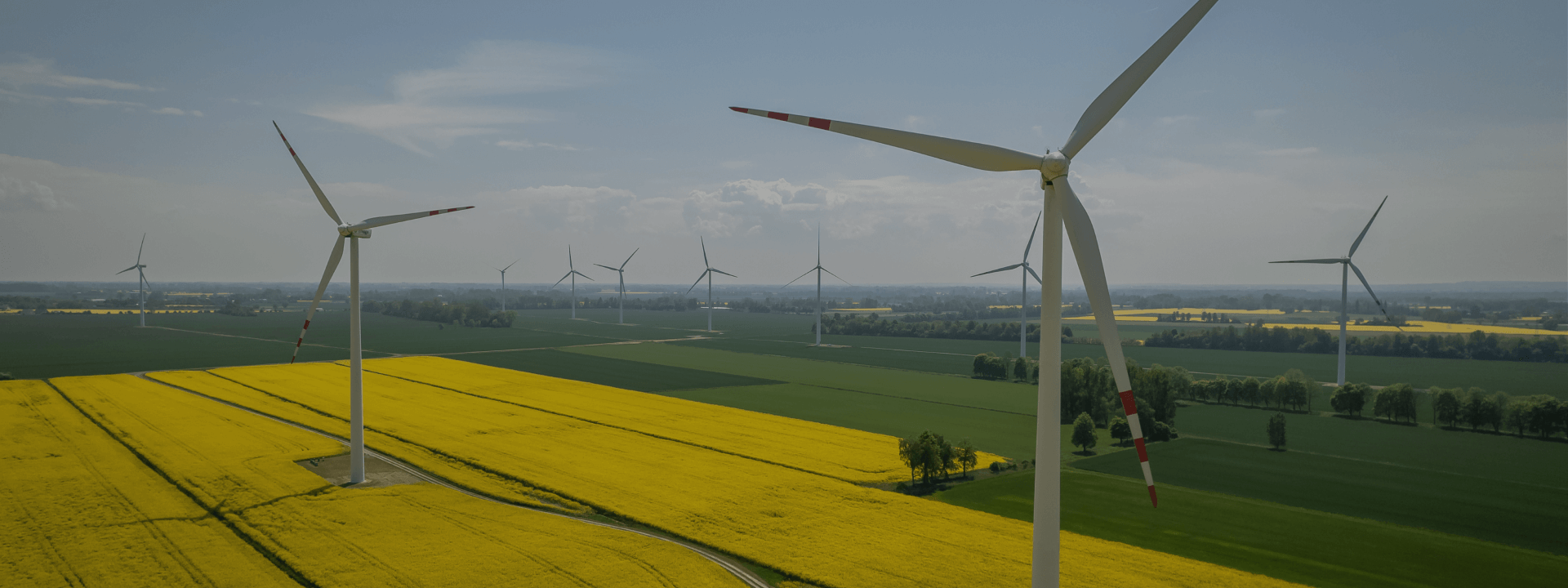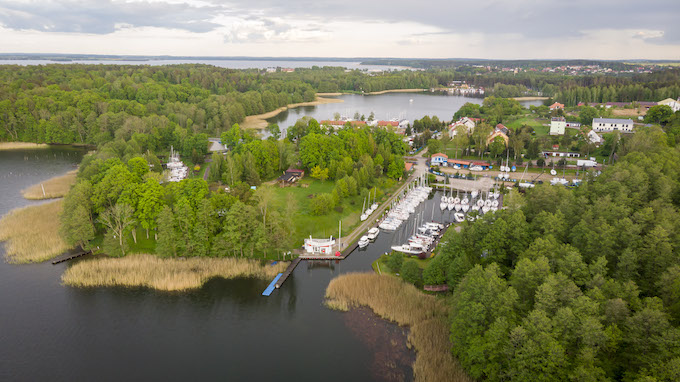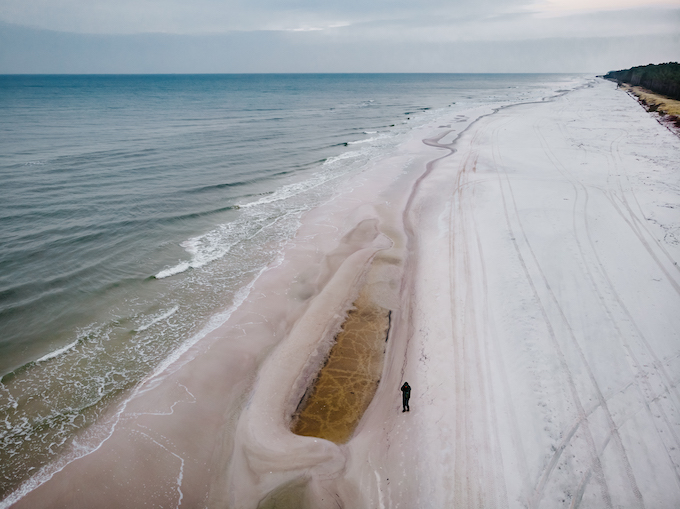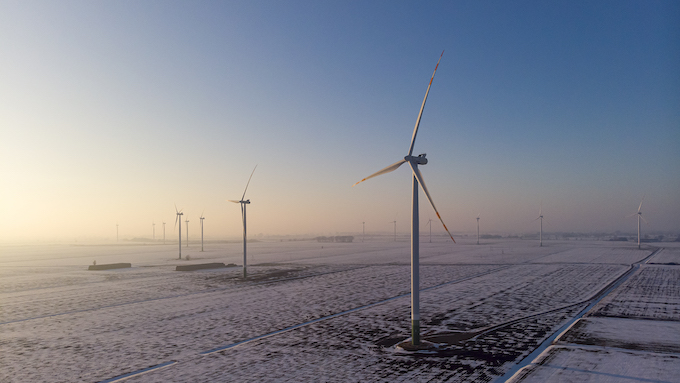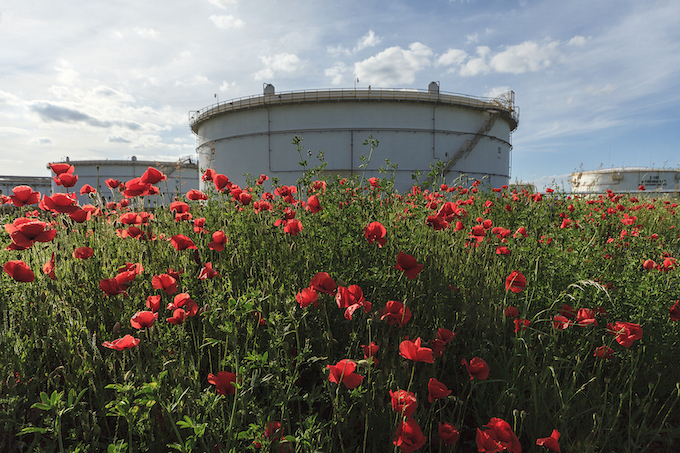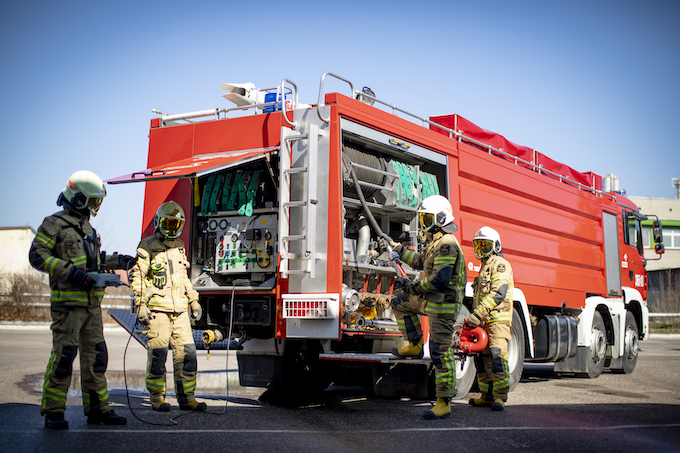The ORLEN Group was the first energy company in Central Europe to have declared its ambition to achieve a net zero carbon footprint by 2050. Maintaining this commitment, we will fast-track the transition with new investments. By 2030, we plan to reduce emissions in our refining, petrochemical and upstream segments by 25% relative to 2019. In addition, we intend to cut carbon intensity in the energy segment by 40%, and lifecycle NCI of all energy products sold by the ORLEN Group by as much as 15%.
Climate responsibility
120
to be spent on green investment projects by 2030
25%
reduction of absolute carbon emissions from Refining, Petrochemicals and Upstream
40%
reduction of carbon intensity in Energy (CO2e/ MWh) and ending the production of energy and heat from coal by 2035
15%
Network Carbon Intensity (NCI) factor reduction gCO2e/MJ2e/MJ
Environment and climate management
- 11.2.1
Management of material topic: climate change adaptation, resilience and transition
- 2-12
Role of the highest governance body in overseeing the management of impacts
- 2-13
Delegation of responsibility for managing impacts
- 2-17
Collective knowledge of the highest governance body on sustainability
The ORLEN Group is consistently implementing the objectives of its ORLEN 2030 business strategy and sustainable development strategy in order to achieve carbon neutrality by 2050. Unveiled in February 2023, the ORLEN2030 strategy sets forth a vision for realising the benefits derived from the mergers with PGNiG and Grupa LOTOS, which are expected to put the new ORLEN Group on track to rapid growth and transition.
Ensuring access to stable supplies of energy, fuel and gas from green sources will be the main goal of the combined ORLEN Group in the period to 2030. On the path to this goal we will primarily invest in renewable energy generation, natural gas and green projects, including biogas and biofuels. We will also develop hydrogen technologies, modern petrochemical assets and safe nuclear power generation.
Governance around environmental and climate-related issues
The management of risks and opportunities arising from climate change is the responsibility of the President of the Management Board and the Member of the Management Board for Strategy and Sustainability, who acts as the Representative for Climate and Sustainability and chairs the Climate and Sustainability Council. The Council reports directly to the Management Board through meetings of the Strategy Committee.
Reducing our environmental footprint and climate impact has long been one of the ORLEN Group’s top priorities. Our approach to management is based on the principles of corporate social responsibility and takes into account environmental criteria. We aim for sustainable development, and we report the results of our climate and environmental protection efforts.
Member of the Management Board for Climate and Sustainability
Responsibilities:
- Supervises sustainability and climate-related issues – identifies climate and sustainability risks.
- Takes measures in response to sustainability and climate-related issues, ensuring the measures are commensurate with the severity of a particular issue to the Company.
Annual reporting:
- on relevant processes and on how frequently the management board and/or management board committees (audit, risk or other committees) are updated on and address at their meetings sustainability and climate-related issues;
- on whether the Management Board and/or Management Board committees consider sustainability and climate-related issues, problems identified during strategy reviews and management, key action plans, management policies, and annual budgets;
- on how the Management Board monitors and oversees progress against goals and targets for addressing sustainability and climate-related issues.
Climate and Sustainability Council
Responsibilities of the Climate and Sustainability Council
Composition of the Climate and Sustainability Officer
Composition of the Climate and Sustainability Council
The ORLEN Supervisory Board exercises ongoing supervision of all areas of the Company’s operations. Two committees, namely the Strategy and Development Committee and the Corporate Social Responsibility Committee, deal with sustainability and climate-related issues as part of their remit.
In 2022, the management of economic, environmental and climate impacts was discussed at 47 meetings of the ORLEN Management Board (86 topics) and at 16 meetings of the ORLEN Supervisory Board and its Committees (33 topics, including 4 topics at 4 meetings of the Social and Environmental Responsibility Committee and 5 topics at 5 meetings of the Strategy and Development Committee).
- 2-2
Entities included in the organisation’s sustainability reporting
- 2-24
Embedding policy commitments
- 2-14
Role of the highest governance body in sustainability reporting
- 2-18
Evaluation of the performance of the highest governance body
All ORLEN Group companies are included in the Group’s sustainability reporting.
In 2023, ESG objectives resulting from the adopted Sustainable Development Strategy were incorporated into the MBO system for all directors reporting to the Management Board, and then cascaded to other managers.
As the parent in the ORLEN Group, by the end of April of each year ORLEN issues the non-financial statement of the ORLEN Group and ORLEN S.A., which is subject to prior approval by the ORLEN Management Board. The non-financial statement includes a description of the business model, non-financial key performance indicators, policies, due diligence procedures in place, potential risks and risk management methods in areas such as social, labour, respect for human rights, environmental, health and safety, anti-corruption and anti-bribery.
A Climate and Sustainability Council has been appointed at the Group's Strategy Committee with responsibility for ongoing sustainability and climate change management.
The Council’s tasks primarily include identifying and monitoring climate opportunities and risks. The body also analyses and reports on climate impacts, including their effect on the performance and financial position, as well as planned capital expenditure. The Council’s responsibilities include publishing information on the resilience of the Group’s strategy to various climate scenarios and developing financial and non-financial KPIs for decarbonisation, water consumption and biodiversity.
Environmental initiatives are also carried out by the Environmental Protection Office, the Water and Wastewater Management Office, and the Energy Area.
The Environmental Protection Office carries out environmental protection projects, ensuring that the Group complies with all applicable laws and regulations in this area. The responsibilities of the Environmental Protection Office include:
- Coordinating activities designed to implement identified legal requirements for obtaining required environmental permits;
- Carrying out environmental monitoring activities on ORLEN’s sites;
- Supervising activities related to air quality analysis, including operation of the Company's Environmental Inspection System;
- Coordinating and taking responsibility for activities related to monitoring, reporting and securing free CO2 emission allowances;
- Environmental reporting in accordance with the legal requirements and calculating and paying environmental charges;
- Issuing opinions and agreeing on environmental aspects of all development plans, investment, upgrade and maintenance projects at ORLEN;
- Participating in environmental inspections of ORLEN’s facilities carried out by external and internal bodies;
- Cooperating with public administration authorities with regard to formal and legal arrangements and fulfilment of obligations imposed by such authorities;
- Supervising the scope and progress of remediation work at ORLEN's facilities;
- Implementing and maintaining the leak detection and repair system (LDAR) at the Płock production plant and the PTA plant in Włocławek;
- Contributing to ORLEN's positive image through environmental education and protection of biodiversity;
- Participating in the efforts to restore the peregrine falcon population in Poland, in partnership with the ‘SOKÓŁ’ (‘FALCON’) Wildlife Protection Association and the ‘SOKÓŁ’ Foundation.
The Environmental Protection Office also works with the environmental protection teams at the ORLEN Group companies to exchange information, share experience and optimise ways to fulfil environmental obligations. This work involves participation in issuing opinions and agreeing on the environmental aspects of development plans and investment, upgrade and maintenance projects, and providing advice on and coordinating activities relating to the scope and progress of remediation work. The Office is also responsible for preparing environmental reporting input data and for developing a uniform approach to environmental issues at the ORLEN Group level. As part of this responsibility, work was ongoing in 2022 to develop objectives for a biodiversity policy that would apply across the ORLEN Group. The policy would reaffirm the commitment of ORLEN Group companies to sustainable and efficient growth, recognising the preservation and promotion of biodiversity as a strategic value.
Responsibilities of the Water and Wastewater Management Office at ORLEN include:
- Managing operations in the area of production of water, collection and treatment of wastewater from the Płock production plant, and coordinating the water and wastewater management activities at the ORLEN Group;
- Ensuring continuity of production and distribution of different water types and collection and treatment of wastewater at ORLEN;
- Ensuring compliance with environmental standards, legal regulations, and permits while maintaining continuity of water production and wastewater collection at the Płock production plant.
Responsibilities of the Energy Area include:
- Implementing strategic projects relating to commercial and industrial power generation and renewable energy sources, i.e. wind, sun, water, and biomass;
- Developing offshore wind projects in the Baltic Sea;
- Trading in heat, electricity and property rights in certificates of origin for electricity;
- Generating and distributing electricity and heat;
- Ensuring compliance with environmental standards, legal regulations and permits while maintaining continuity of power generation in its area;
For information on key policies and internal regulations on environmental and climate issues in place at the ORLEN Group, see ‘Policies and internal regulations’.
Compliance with laws and regulations
Impact of regulations
The ORLEN Group analyses new regulations resulting from the European Green Deal on an ongoing basis and adjusts its business models accordingly. The ORLEN2030 strategy is designed to capture the opportunities created by Europe's economic transformation which aims to meet the obligations under of the Paris Agreement and implement the UN Agenda 2030.
Key external regulations affecting the ORLEN Group’s business
European Green Deal
Regulation establishing the framework for achieving climate neutrality and amending Regulation (EU) 2018/1999 (European Climate Law). The Regulation sets out a binding objective of climate neutrality, including the achievement of net-zero greenhouse gas emissions (relative to 1990 levels) by 2050 at the European Union level, and requires the European Parliament, the Council, the European Commission and Member States to take measures both at Union and national level to enable the achievement of this objective.
Under the provisions of the Regulation, the European Commission (EC) is to assess the EU’s 2030 climate target of reducing greenhouse gas emissions by at least 40% compared with 1990 levels in light of the objective of achieving climate neutrality by 2050. In particular, the EC will examine the possibility of setting the greenhouse gas emission reduction target for 2030 at 55% compared with 1990 levels and will consider adopting appropriate legislative proposals in this respect.
CO2 emission allowances." data-popup>EU ETS
Implementation of secondary legislation for the fourth phase of the GHG emissions trading scheme, including the decision approving free allocations for 2021–2025. Issuance of the European Commission’s guidelines amending the system of compensation for indirect emission costs for 2021–2030, which started a process to amend the Act on the Compensation Scheme for Energy-Intensive Sectors and Subsectors. Establishment of a dedicated state fund – the Energy Sector Transformation Fund following an amendment to the Act on the GHG Emission Allowance Trading System.
EU Taxonomy
Regulation of the European Parliament and of the Council of June 18th 2020 on the establishment of a framework to facilitate sustainable investment (the EU Taxonomy). The Regulation establishes a framework for determining whether an economic activity qualifies as environmentally sustainable. It introduces, among other measures, harmonised and transparent funding rules and support criteria for green investment projects, as well as provisions to prevent investing EU funds in carbon-intensive technologies.
Fit for 55
The Fit for 55 package of draft amendments to EU directives and regulations is to serve as a basis for implementing the EU’s revised target to reduce greenhouse gas emissions by 55% by 2030. The new target is a major challenge, but also an opportunity for a fair economic transformation in Poland and across the European Union.
If the proposed solutions are adopted, they will have a significant impact on the Polish and EU economy, which will directly affect ORLEN’s operations in the coming years.
Key objectives: reduction of GHG emissions in the EU by 55% relative to 1990 levels by 2030, inclusion of the transport and construction sectors into the EU emissions trading scheme (EU ETS), raising the target for the share of renewables in energy generation from the planned 32% to 38%–40% by 2030, raising the energy efficiency target from 32.5% to approximately 38%–39% by 2030, introduction of the carbon border adjustment mechanism (CBAM), increase in the transport emission reduction targets.
Emission reduction
The ORLEN Group was one of the first multi-utility groups in Central Europe to declare, in September 2020, an intention to achieve a net zero carbon footprint by 2050.
The ORLEN Group was one of the first multi-utility groups in Central Europe to declare, in September 2020, an intention to achieve a net zero carbon footprint by 2050. On the path to this goal, by 2030 the ORLEN Group will cut emissions of CO2 e (greenhouse gases converted into carbon dioxide equivalent) from its refining, petrochemical and upstream assets by 25%, reduce carbon intensity of electricity and heat generation (CO2 e/MWh) by 40%, and bring down net carbon intensity (CO2 e/MJ) by 15%. By 2035, the ORLEN Group will phase out coal-based power and heat generation. The carbon neutrality strategy we have announced is founded chiefly on energy efficiencies to be achieved in our production activities, zero- and low-carbon power generation, and fuels of the future.
ORLEN Group operational emission.
1 Emissions volume in the Refining, Petrochemicals and Upstream segments, measured as MtCO2e, for Scope 1 and Scope 2 emissions.
2 Carbon intensity in the Energy segment, measured as kgCO2e/MWh, for Scope 1 w emissions.
3 Carbon intensity of energy products sold, measured as gCO2e/MJ, for Scope 1, Scope 2 and Scope 3 emissions.
4 Our ambition to reduce emissions is consistent with the goal of limiting climate warming to 1.5 °C by 2050. Achievement of our long-term targets will depend on the technological progress and the regulatory and legal context. Those factors may create more or less favourable conditions for the energy transition and accelerate or reduce the pace of our strategy implementation.
CO2 emissions in Refining, Petrochemicals and Mining.
* Emissions volume in the base year will be subject to final review after the merged ORLEN Group companies are fully consolidated.
Power generation at the ORLEN Group [TWh]
Coal-fired power and heat generation
15% reduction in net carbon intensity (NCI) by 2030.
1 Net carbon intensity (NCI) measures emissions per unit of energy sold (gCO2e/MJ). Its calculation accounts for all direct emi2ssions (Scope 1), emissions related to the purchase of energy and heat for own use (Scope 2), and indirect emissions resulting from the use of products sold (Scope 3, Category 11). The numerator excludes volumes of carbon dioxide capt using CCUS technologies as part of services provided to third parties. Energy content of products sold comprises sales of traditional fuels (diesel oil, gasoline, gas, etc.), low- and zero fuels (biofuels, hydrogen, biogas, etc.), electricity and heat. Emissions from the production of petrochemicals (non-energy products) are not included in the calculation of NCI.
* Emissions volume in the base year will be subject to final review after the merged ORLEN Group companies are fully consolidated.
The ORLEN Group intends to invest about PLN 120 billion in green projects in the period from 2023 to 2030. Over the next few years, we plan to allocate some PLN 3 billion to key R&D investment areas, with a particular focus on green technologies. In this way, we are taking an active approach to balance the challenges and opportunities created by the transition. We are working actively to improve our performance in the face of climate challenges.
ORLEN Group’s green projects by business area.
1 In real terms for 2023.
2 Equivalent to 0.5-0.7 bcm of biomethane.
For the first time in history, the need for environmental protection and concern for our planet have become key drivers of the energy transition. How our world will be fuelled and which energy source will play a dominant role in the future mix will be determined not only by viable technologies and economics, as was previously the case, but also by environmental considerations. The technologies and energy sources leading the energy transition will fit in with the broad sustainable development trend and ensure that the population’s energy demand is met, while mitigating the environmental impacts and remaining economically viable.
Compliance with laws and regulations
- 2-27
The operation of units used by ORLEN Group companies is regulated by integrated or sectoral permits. The permits define emission limits which are safe for the environment and human health. Observance of those limits is monitored based on continuous and periodic measurements. Compliance with the requirements and obligations under applicable environmental laws and with the terms of applicable permits was also assessed through inspections carried out by environmental protection authorities.
In 2022, a total of 32 cases of non-compliance with environmental standards, including those specified in the permits, were identified at ORLEN Group companies. They involved occasional incidents that did not result in any significant long-term negative environmental impacts.
In 2022, ORLEN Group companies underwent inspections by environmental authorities, which assessed their activities in terms of impact on various components of the natural environment. Inspections were carried out in a range of areas, including waste management, wastewater management, use of natural resources, examination of the quality of surface water and discharged wastewater, analysis of air emissions, compliance with requirements applicable to operators of installations that require an integrated permit, scale of noise emissions and noise impact distance, management of green areas, compliance with requirements applicable to users of emission allowances, compliance with requirements for the safe storage and use of chemicals, compliance with fire regulations and requirements for the prevention of major accidents.
A total of 158 inspections were carried out, including: 123 scheduled inspections, 15 inspections made at the request of a Group company, and 20 emergency inspections initiated on the basis of a notification from a third party. During 28 inspections, violations of the terms of applicable permits or decisions, and/or instances of non-compliance with environmental standards were found. The respective companies were required to implement post-inspection measures. In two cases a fine was imposed. Where possible, appropriate mitigation measures were promptly implemented to ensure that the companies' activities do not cause excessive environmental emissions of pollutants and do not result in exceeding the limits set by the applicable regulations, permits and decisions.
Based on the inspection findings, the respective companies were required to implement post-inspection measures. In only two cases fines were imposed, totalling PLN 53,940. ORLEN's Płock and Włocławek production plants underwent 7 scheduled inspections and 2 emergency inspections.
ORLEN’s service stations, fuel depots and fuel terminals underwent 20 scheduled inspections, 8 inspections conducted at the Company’s request, and 7 emergency inspections. In the case of 12 inspections, the following violations of applicable decisions and permits were identified: operation of units in breach of the terms of the relevant notification; Exceeding permissible noise levels in connection with the operation of a car wash; Exceeding the permissible pollutant volumes in sanitary sewage discharged into the ground; Inaccuracy of information contained in the documentation of an upper-tier establishment; Failure to update a service station notification with respect to air emissions; Failure to review the notification of the accident prevention programme, safety management system, safety report and accident prevention programme before making changes to plant and process units;
No manual describing safe operation of hydrocarbon recovery units; Withdrawal of underground water from a well for a service station without the required water permit; Local contamination of the aquatic environment with petroleum substances; No valid decisions on water permits for the discharge of car wash wastewater and rainwater into the sewer system. As part of post-inspection measures, operators of the respective service stations, fuel depots and fuel terminals undertook to remove the identified deficiencies, for instance by providing the missing documentation (including technical documentation), obtaining the required decisions (including water-law permits), removing contamination, and reducing the scale of noise emissions and noise impact distance.
For more information on the opportunities and risks of the energy transition, see here.
- 11.2.4
Organisation’s approach to public policy development and lobbying on climate change
We are aware of our role in mitigating climate change – ORLEN Group's long-term goal is to achieve a net zero carbon footprint by 2050. In 2023, we adopted a Climate Policy and updated the short-term decarbonisation targets to 2030. At the end of 2022, the ORLEN Group published its overall carbon footprint (Scopes 1, 2 and 3) and implemented climate management in accordance with TCFD (Task-Force on Climate-Related Disclosures) recommendations by appointing an ORLEN Management Board Member – Representative for Climate and Sustainability, and the Climate and Sustainability Council, which reports to the Group Strategy Committee. The Supervisory Board, through the Social and Environmental Responsibility Committee, also monitors climate and sustainability performance.
ORLEN is an active member of various organisations and associations engaging in the development of public policy and advocacy on climate change, such as CO2Value Europe, Hydrogen Europe, European Clean Hydrogen Alliance,International Association of Oil and Gas Producers (IOGP), European Chemical Industry Council (CEFIC), Renewable Low Carbon Fuel Alliance (RLCF), Polish Alternative Fuels Association, Polish Chamber of Electromobility Development and Polish Chamber of Chemical Industry (PIPC).
As part of their activities ORLEN representatives contribute expert knowledge and opinions. Participation in such initiatives facilitates exchange of knowledge and experience as well as promotion of technologies and solutions with lower impact on the climate and environment.
- 11.2.2
Financial implications and other risks and opportunities due to climate change
- 11.3.3
Assessment of the health and safety impacts of product and service categories
Identification, assessment and management of climate-related risks and opportunities – physical risks
Identification, assessment and management of climate-related risks and opportunities – energy transition risks
Identification, assessment and management of climate-related risks and opportunities – energy transition opportunities
After 2030, the impact of climate change on the ORLEN Group markets may be more significant
Climate Policy
The ORLEN Group Climate Policy was published in 2023. The document paints a comprehensive picture of the ORLEN Group’s approach to managing climate-related issues and systematises its existing initiatives in this area.
The ORLEN Group Climate Policy sets out the specific measures taken by the Group on the road to carbon neutrality, and describes in detail how the decarbonisation targets are pursued and how the climate oversight function has been set up within the organisation. It specifies, among others, the responsibilities of the Climate and Sustainability Council and the Climate and Sustainability Officer. The function of the Climate and Sustainability Officer (and Chair of the Council) has been assigned to the Management Board Member responsible for Strategy and Sustainability. An important part of the Policy is the analysis of climate risks and opportunities. It discusses physical risks (such as rising temperatures and extreme weather conditions) that are materialising due to climate change, as well as transition risks, that is organisational and business changes that must be effected for the Group to grow and remain competitive beyond 2030. The document also examines opportunities presented by low- and zero-carbon energy and sustainable mobility.
The ORLEN Group Climate Policy was prepared based on guidelines from the TCFD (Task Force on Climate-Related Financial Disclosures, established in 2015 by the Financial Stability Board, an international body that monitors and makes recommendations about the global financial system). It is the most widely recognised reporting framework endorsed by financial institutions to help drive consistent climate change-related disclosures by companies. Plans for the coming years include updating the climate policy, as well as periodic reporting on the progress in delivery of the decarbonisation targets.
The material is available on www.orlen.pl.
Preparations are under way for the construction of the Baltic Power offshore wind farm, a joint project between the ORLEN Group and Northland Power. The farm, with a capacity of up to 1.2 GW, will be located about 23 kilometres off the coastline, near Choczewo and Łeba. It will be able to generate clean energy for more than 1.5 million households.
Hydrogen transport
In June 2022, we launched Poland’s first mobile hydrogen refuelling station in Kraków. Hydrogen from the ORLEN Group’s biorefinery in Trzebinia powers the cells of a zero-emission bus tested on public transport routes in Kraków. In Poznań ORLEN and the Municipal Transport Company (MPK) signed a contract for the supply of hydrogen fuel to power zero-emission city buses. It is Poland’s largest hydrogen project of that type to date, and one of the very few such projects in Europe. As regards private transport – in early 2023, we launched our first publicly available hydrogen refuelling station in Prague, the Czech Republic, soon to be followed by the first public stations in Poland, including in Wałbrzych, Poznań, Katowice, Bielsko-Biała, Gorzów Wielkopolski, Kraków, Warsaw and Piła. They are being deployed as part of the flagship project ‘Hydrogen Eagle’, approved by the European Commission under the IPCEI (Important Project of Common European Interest) Hy2Use programme.
- 11.16.1
Management of material topic: land and resource rights
- 11.16.2
Resettlements due to the organisation’s operations
The above indicators do not apply in the case of the ORLEN Group.
- 11.17.1
Management of material topic: closure and rehabilitation
- 11.17.2
Incidents of violations involving rights of indigenous peoples and measures taken
- 11.17.3
Operations on land where indigenous peoples reside
- 11.17.4
Agreement with indigenous peoples
The ORLEN Group does not operate in any areas inhabited by indigenous peoples.
For detailed information on the management of environmental and climatic risks, see „Risk management”
Read also:
Short-cuts:
ORLEN Group 2022 Integrated Report
You can also download the report in PDF format
